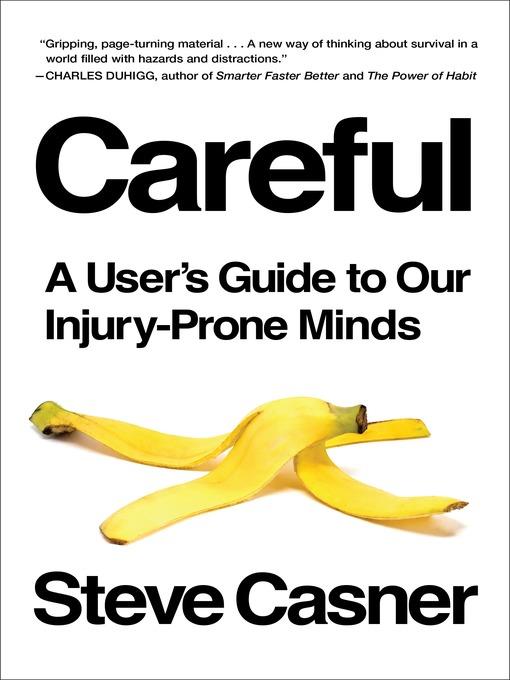
Careful
A User's Guide to Our Injury-Prone Minds
- اطلاعات
- نقد و بررسی
- دیدگاه کاربران
نقد و بررسی

February 20, 2017
“Being careful today seems harder than it used to be,” observes research psychologist Casner in this fascinating debut. The number of fatal injuries has declined significantly over the past century, but since 1992, accidents have actually been on the rise, which Casner attributes to the influx of technological innovations. He proposes a proactive response, stating, “the next safety revolution is going to have to happen in our own minds.” Using real-life examples, research studies, statistics, and his own experiences, he identifies six basic human vulnerabilities that lead to accidents: inattention, making errors (and being unable to admit them), taking risks, not thinking ahead, failing to look out for other people, and being unwilling to receive or dispense advice. Casner stresses that it is up to each individual to consciously try to overcome these failings. He cautions that people are constantly flooded with an enormous amount of information, which can make it even harder to make wise decisions. Riveting and relatable, Casner’s book will inspire readers to take a good look at their own lives and the safety precautions they take on a daily basis. Agent: Sandra Dijkstra, Sandra Dijkstra Literary Agency.

April 1, 2017
A safety expert offers a concise, common-sense guide to not being killed by stupidity.In his debut, Casner--a research scientist in NASA's Human Systems Integration Division, which helps maintain strict safety standards for astronauts and others involved in the aerospace field--offers a sharp, concise review of the things that can kill or harm us, how we contribute to the problem, and what we can do together to make us all safer. With specific categories like transportation, watching children, interacting with doctors, and taking and giving advice, the author addresses universal, daily situations in which people are exposed to potential harm. One might think it's another Silicon Valley cheer for technology, but not only does Casner think we're less safe today, he believes the helpfulness of our available tools has reached its peak ability to save us from ourselves. "In this book I will argue that we have come to the end of a really good run," he writes. "That we have wrung all of the big gains we're going to get from putting rubber corners on stuff and saying, 'Hey, don't do that.' Companies aren't going to rescue us from this quandary with new safety features." Instead, the author argues for a fundamental change in the perception of risk and our related behaviors. The risks he identifies in our injury-prone minds are delightfully simple, and he stresses the importance of paying attention, gauging risks, planning ahead, and looking out for each other. To illustrate his points, he uses real-life examples, from red light-running to the 2003 Rhode Island nightclub fire that killed 100 people. Although Casner employs a gentle sense of humor, the book's greatest strength is the author's encouragement of compassion for others in everyday life: "We sometimes miss the point that we're all in this together and we really are one another's greatest resource."A modest proposal for a fundamental change to help us not hurt one another.
COPYRIGHT(2017) Kirkus Reviews, ALL RIGHTS RESERVED.

Starred review from April 1, 2017
Casner, a research psychologist at NASA with decades of experience in the safety industry, states that the "safety revolution" is long overdue. With startling statistics, such as that there are 350 deaths caused from preventable injuries each day in the United States alone, his work suggests that we may be remiss if we don't start listening. He considers how our ability to pay attention is incredibly inept, that we are bound to make mistakes and take unnecessary risks, asserting that we often overestimate our ability to stay focused and multitask. How often do people text and drive despite knowing the ramifications? Casner informs us of our limitations and vulnerabilities, not as an insult, but rather to make us aware of the situations that can arise. He provides information on how to prevent these mistakes through awareness and by thinking ahead to possible outcomes. With humor and eye-opening data we may all hopefully become more engaged in our day-to-day lives and keep ourselves and one another safe. VERDICT Casner makes an overwhelmingly compelling case for safety. One of the most intelligent and impactful books; everyone should read it.--Melissa Keegan, Ela Area P.L., Lake Zurich, IL
Copyright 2017 Library Journal, LLC Used with permission.




دیدگاه کاربران